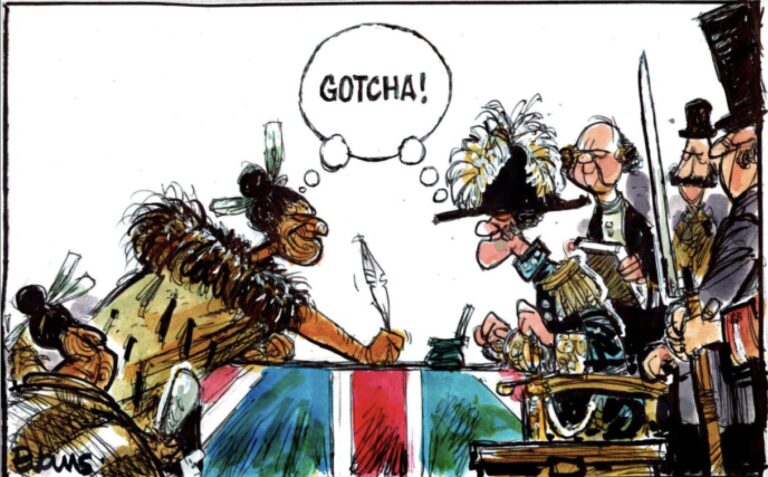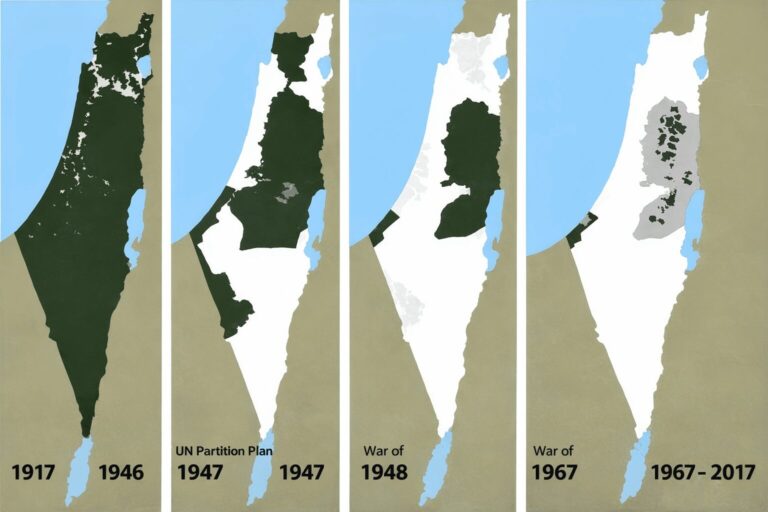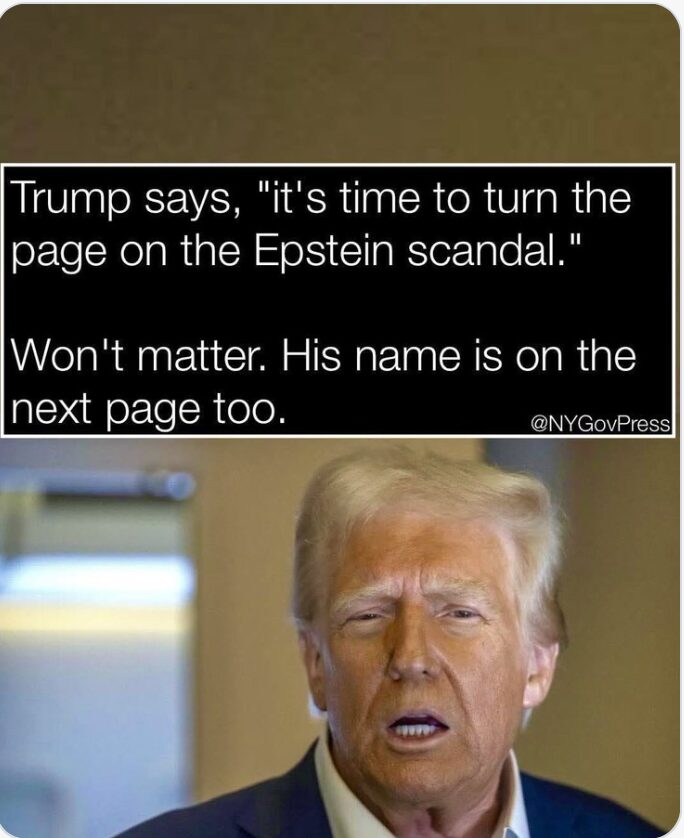No Good Options.
Will Co-Governance Break Our Democracy?
THERE ARE MOMENTS IN HISTORY when all the options available to political leaders are bad. The British Prime Minister, Neville Chamberlain, faced such a moment in the late-1930s. New Zealand’s current political leadership is facing an equally fraught range of options. Already, there is no course of action available to either Jacinda Ardern or Christopher Luxon that does not, ultimately, end in tears.
How did we arrive at such a dangerous moment?
For the beginnings of an answer we must look to the Bicultural Project developed by the New Zealand Left in the 1980s. In its essence, this project was an attempt to retain the coherence of the New Zealand working-class by building a much greater level of cultural understanding between Pakeha and Māori workers, thereby ensuring that any improvements in living standards and political influence would benefit both ethnicities equally. In its first iteration, at least, the Bicultural Project was about class and culture. A rising economic tide, born of working-class unity, would lift all boats – and waka.
Māori nationalists were having none of it. From their perspective, the original Bicultural Project was just another Pakeha ruse for remaining in charge of the evolution of the New Zealand state. From the very beginning, nationalist writers – most notably Donna Awatere – were at pains to make it clear that the acquisition of Tino Rangatiratanga, Māori Sovereignty, would be achieved in spite of, not by the grace and favour of, the “White Left”. Māori nationalists of aristocratic lineage evinced only scorn for the trade unions and the left-wing parties. Their goal was always admirably clear. They wanted their country back. All of it. Now.
Perhaps, if Rogernomics had never happened, some sort of compromise might have been reached. We’ll never know. The Neoliberal Revolution smashed the unity of the New Zealand working-class into a thousand pieces. As always in this country’s history, massive economic change hit Māori communities the hardest. Meanwhile, what was left of the traditional Pakeha working-class was demobilised and disarmed by the Employment Contracts Act. Within a few years the White Left had ceased to exist.
Biculturalism 2.0, however, neither needed nor wanted any sort of Left. Māori nationalists found Neoliberalism’s take on the Bicultural Project much more encouraging than the Marxists’ version. Lord Cooke of Thorndon’s 1987 “partnership” formulation of the Treaty relationship dovetailed neatly with the neo-tribal capitalism mandated by the Crown/Iwi-based Treaty Settlement Process. The resulting quasi-autonomous ethnic corporations, working hand-in-glove with the Executive Branch of the New Zealand state, were now on course to produce an entirely new set of constitutional possibilities.
The relentless promotion of the so-called “Partnership Model” within those institutions directly controlled by, and/or beholden to, the State, combined with a young Māori elite, educated by the Iwi corporates, and strategically located by sympathetic public servants at the myriad power-points of the state apparatus, transformed the human resources of the Crown into a powerful ideological force. In alliance with the free-floating Iwi corporations, the New Zealand state and its appendages – especially the major political parties, the mainstream news media and the universities – were now ready to proceed to the next phase: Biculturalism 3.0 – also known as “Co-Governance”.
Given the intense preparation which has gone into raising Māori expectations of co-governance, it would now be extremely dangerous for any political party to bring its institutional evolution to a halt. That said, the lack of any serious preparation of the non-Māori population for the revolutionary implications of setting New Zealand’s democratic political system aside in favour of “parity” between the Treaty “partners”, has already set in motion the growth of potentially massive electoral resistance to the co-governance project.
On the Pakeha Right the expectation is that the National and Act parties will, between them, bring the “anti-democratic” innovations of “Māori radicals” to a shuddering halt. The vehicle for this moratorium is the Act Party’s “bottom-line” referendum on co-governance, the result of which the Right (almost certainly correctly) regards as a forgone conclusion. Should National indicate in any way its reluctance to adhere to Act’s bottom-line, then its grip on the right-leaning electorate will be weakened profoundly – boosting Act’s support and quite possibly bringing the NZ First Party back into Parliament.
On the Centre-Left, by contrast, there is a growing level of apprehension that its steadily declining level of support – as registered in the opinion polls – will require not only the seats of Labour and the Greens, but also those of Te Pāti Māori, if “progressives” are to retain possession of the Treasury Benches. With support for Te Pāti Māori rising (at the Greens’ expense) neither Labour nor the Greens will be able to signal any retreat from their commitment to the co-governance project.
Even within Te Pāti Māori, fears will be growing that the support it is attracting in the polls may not end up being reflected in the polling-booths. Younger voters are notoriously difficult to mobilise, especially when compared to older voters (who can be relied upon to cast their votes with an almost religious devotion). To get these younger voters “off the couch”, Te Pāti Māori will need to present the coming election as an existential threat to the future of tangata whenua in Aotearoa. Co-governance will thus be elevated to a non-negotiable component of the nation’s future.
Labour and the Greens will find themselves being dragged further and further to the left in order to keep this nascent Red-Green-Brown coalition together. To distract their still dubious working-class Pakeha supporters from the co-governance question, Labour may lay before them reforms aimed squarely at dismantling the neoliberal economic order in favour of “real Labour policies”. With the Greens and Te Pāti Māori shouting “Me too!”, it will be the turn of National and Act to paint the forthcoming election as not only an existential threat to democracy, but also to the socio-economic status quo.
Clearly, not everybody’s expectations can be fulfilled in a democratic election. Historically, the voters on either side of the political divide have understood and accepted this state of affairs. There is always next time.
The risk New Zealand runs in 2023 is that the policy promises of the contending parties will be come to be seen by their respective supporters as critical to the survival of the nation. On the Right, the introduction of co-governance will be equated with the death of democracy. On the Left, a racist referendum endorsing the elimination of co-governance will be construed as an all-out assault on the Treaty of Waitangi and the indigenous people it was intended to protect.
In such circumstances, the uncompromising partisans on both sides begin to believe that if they concede defeat there will be no “next time”. At that point the cry goes out for a “continuation of politics by other means”. Bullets replace ballots, and peace ceases to be an option – for anybody.







If the changes were to go through, could that mean that ultimately, in the future, some people would need to take a DNA test in order to vote in their preferred manner?
I keep reading that it was the Nats who began this process.
If so, what guarantees are there would that voting in a change of govt would make much difference?
Given that pre-election “promises” seem to be made to be broken (Key: “Won’t raise the GST” – we live with the tragic effects of that one.)
Adern is a Blairite. Blairites always see a move further to the right as a solution to falling poll numbers. That and policy based on the feedback from focus groups provided it doesnt disrupt the market. This lot wouldnt know a left wing policy if it bit them on the arse.
I identify as any group in society that gets the most votes from now on. That is my reality!!!
I think this analysis is spot on.
For well over a decade now historic Treaty settlements have included co-governance regimes. It is vital that the integrity of those settlements be protected, or else we go back to square one with historical claims. Not somewhere good to go.
Of course those provisions were reasonable things to have negotiated. Settling Maori want a say in the governance of resources, particularly resources near and dear, and which are often regarded as essential parts of ‘who they are’, or even indivisible from the group. We all feel and want some version of that – subsidiarity as you’ve recently talked about Chris.
Yet the rationale for historic settlement processes contemplating co-governance redress is different to the rational for the bulk of other settlement redress. The return of land, rights of first refusal, financial redress etc. These were always seen to be – both on the terms of the Treaty and in the eyes of governments – about the return of wrongly-taken property rights. For the legislature to cede governance rights is purely an issue of Crown honour.
Accumulating unbreakable co-governance obligations was always going to have two effects. One, it would eventually raise expectations in parts of Maoridom for co-governance outside of a settlement context. Thirty years in, this expectation has become considerable among some. But two, having erected a democratic country over more the century since the wrongs being righted in historic settlements, and yes actually meaning it for most or all of that time, equally, the accumulation of settlement-based co-gov obligations was always eventually going to pose challenges in the wider polity. Especially when strong non-settlement co-gov expectations found political support. They would always pose “one person one vote” issues under those inevitably-coming conditions.
So the settlement co-gov was reasonable. And it goes without saying that it was never going to be desirable or possible to receive the ratification of the public to every settlement, to mirror popular iwi ratification. Equally unpalatable would have been explaining the dynamic of accumulating co-gov obligations to the public in advance. So a widely un-discussed accumulation of obligations we got. It sowed the seeds, nigh on inevitably, for today’s situation. Ironical given that the in attempt to do right so sincerely may be the seeds of its own unwinding.
Why did (primarily) the National party think this situation would not come to pass? One – they genuinely seem to have pursued settlements because of their belief in the property rights analysis of the historic settlements. But once in, the honour side of things was hardly optional. Two, it seems to me, they subscribed to the (beautiful) idea that the recipient of a sincerely given apology is under a moral obligation to forgive. They truly believed settlements would be “it”.
That was always going to be somewhat naïve, not to mention in a cross-cultural context, or even any interpersonal one. Some people would always have different takes on all those issues, and some subset of those people would always seek to game a difference of views. That’s just humans. Their view was also silly unless they also pursued economic policies that narrowed inequalities in fact.
So we now have a serious knot. There is a lot to be said about how to get out it without getting into existential territory. It is needed now. Our impoverished contemporary identity analysis and language are not helping – too much demonising and too much romanticising. Unfortunately all roads lead to quite a lot of truths being held up simultaneously. One: historic settlements must endure and they contain extensive co-governance. Two: possible future historic settlements, including in re freshwater, may extend that further. Three: New Zealand citizens have the same civil and political rights and duties. Four: to the extent that “partnership” undermines that, it is not legitimate. Five: that is not to say significant devolutions and subsidiarity – ie tino rangatiratanga and mana motuhake – are not possible within that framework. And so on.
Thanks for your contribution.
“The Labour [Government] has no choice but to vote against the Rotorua District Council (Representation Arrangements) Bill after Attorney General David Parker found the Bill would limit the right to be free from discrimination and cannot be justified under the Bill of Rights Act,” says ACT Leader David Seymour.
“This Bill was always anti-democratic. It was brought to Parliament as a local bill by former Waiariki MP Tamati Coffey, who is now a list MP, and supported by Labour at first reading.
“The bill was prepared by the Rotorua Lakes Council to allow it to have more Māori seats. Māori make up 28 per cent of voters in the area and the Bill would have give the 31 per cent of the vote.
“The assessment by David Parker says: “The conclusion I have reached, that the Bill cannot be justified under s 5 of the Bill of Rights Act, is largely due to the absence of information and analysis available to provide justification for the limit on the right to freedom from discrimination… I have concluded the Bill appears to limit the right to be free from discrimination affirmed in s 19 of the Bill of Rights Act and cannot be justified under s 5 of that Act.”
“All of the good political movements of the past four hundred years have been about ending discrimination on the basis of race, religion, sex and sexuality to treat each person with the same dignity.
“ACT believes this Bill should now go to the Privileges Committee rather than the Māori Affairs Committee. The Māori Affairs Committee is already expected to refer the bill back before it is due, it is more focused on rushing the bill than scrutinising it.
““Liberal democracy matters. Every adult New Zealander gets one vote. Superficial characteristics like race, sex, sexuality and religion are not relevant to our rights. Being the first in the world to achieve that is New Zealand’s greatest political achievement.
“ACT is appealing to the Government to make openness and inclusion the non-negotiable condition for work on our country’s constitutional future. That starts with voting down this bill.”
https://www.scoop.co.nz/stories/PA2204/S00167/attorney-general-rejects-rotorua-bill.htm
2022 and we are questioning one person one vote? How did we get here?
Peace has not been an option for a long time. I can still remember Ernie Abbott. That was 1984 at the height of the neo-liberal uprising. Since then our votes have had less and less meaning until now when there is little or no purpose to voting.
Those who control land – the landed gentry – control the country. Our forebears, having fled the impoverishment imposed on them then by Britain’s landed gentry, then immediately set about imposing that self-same system here, on the Maori.
Maori, after initially seeing European settlement as a boon, soon realized that the parting with their land, that went with it, was parting with their power to participate in decision-making, and so tried to halt the process. Valiantly trying to stop land sales, or to negotiate leasing arrangements that would enable them to retain ownership, they were ignored by the colonialists and so went to war, which ultimately saw them brutally smashed down and their lands then simply confiscated.
Ironically today, as house prices soar beyond the average Kiwi’s ability to “participate” in the housing market, many are experiencing, in essence, the same dispossession that Maori experienced all those years ago, some even doing as their forebears did and emigrating to other lands, but they don’t see the connection.
That aside, “Co-governance” is a means of giving Maori a modicum of the power which retention of their land at the outset would have accorded them, and our “landed gentry” don’t like it.
Co governance continues by stealth where a stacked Rotorua council is having Labour push through a bill ending universal suffrage : they wish there to be no more one person one vote, starting in Rotorua.
The submission process was obscenely shortened to 2 weeks.
None less Graeme Edgeler submits against here:
https://publicaddress.net/legalbeagle/the-local-bill-to-remove-equal-suffrage/
“ There are a range of concerns arising from this bill, which suggest it is at best unnecessary, and at worst, profoundly contrary to established democratic principles.”
Oddly enough I think ACTs proposal to discuss and debate all of this could actually help but only if both sides can do so without screeching insults at one another.
The treaty has no reference to partnership or co-Governance, all it states is that the Queen is sovereign, people have property rights and last but most importantly we are equal under the law
As a society NZ has never discussed the shift being driven behind the scenes and by incremental stealth that Chris outlines and I can’t help but think that a referendum such as the one ACT has proposed would see an outcome not dissimilar to that of the UK voting for Brexit which was in many ways a vote against the elites and the establishment’s love for unfettered immigration.
So yes, I agree with Chris insofar as a referendum would be hugely disruptive however I think it will be to our own elites who will be the ones fighting to shut it down as outside of the cesspit that is Wellington most of us just want to be left alone to live amongst all New Zealanders regardless of who our ancestors may or may not have been.
The average kiwi is a decent and fair minded person and the belief that we should all get a chance to have a suck of the sav is deeply ingrained in what is still a very egalitarian society on a global stage. There’s so much hullabaloo about this co-governance malarkey because the fat cat elites are terrified that the man and woman in the street will see it for what it is, an unashamed asset grab and vote against it and further imposition of contrived and falsely fabricated principles upon us all thereby derailing their gold plated, fur lined gravy train.
We should be excited and energised about the chance to debate this subject as it will define who we will be in the future and we should be brave enough to acknowledge and speak of the horrors committed in the past by all parties as well as being proud of the many incredible things this small country should rightfully be proud of.
The very fact that so many on the left don’t want the debate and most certainly don’t want the people to have a say in a referendum is hugely informative as to their confidence around the strength of their argument.
Unless we talk about it, this issue is just going to fester and rot and that l believe will be far worse in the long run for NZ rather than a year or three of robust debates and noisy protests.
Are we to become the peoples republic of Aotearoa where access to healthcare, education, welfare and the very strength of one’s vote is determined by one’s ethnicity or will be a nation where all are given an equal chance and all have an equal say regardless of anything other than citizenship.
Well said Yeti.
Whats really sad is that while labour have invested heavily in this they have done nothing to address inequality. For example the government spent 16 million on a review of the treaty provisions in the Conservation General Policies. The group was made up of members of the Maori elite and the final document calling for the house to be pulled down (DOC removed and replaced by an iwi authority etc) was so extreme it will likely to filed away and never seen again. https://www.doc.govt.nz/our-work/partial-reviews-of-conservation-general-policy-and-general-policy-for-national-parks/options-development-groups/options-development-group-report/
Maori now make up just over 50% of those on the state housing waiting list. https://www.scoop.co.nz/stories/AK2204/S00169/labours-disgrace-the-housing-catastrophe-for-low-income-families-rolls-on.htm
That money could have built 30+ new houses for Maori. That’s what I find so abhorrent about the governments direction on co-governance – it only serves Maori corporations and elite while the situation for lower down the ladder gets ever worse. Sad really.
A clear indication of where this government is leading us is now on show in Rotorua, where Tamati Coffey, who didn’t even get sufficient support in his own electorate to retain his seat, now returns like a bad smell to introduce a Local Bill for the Rotorua District Council that seeks to throw out the one person, one vote principle, as it is enshrined in the Local Electoral Act.
I cannot believe that in the 21st century a major political party in a western democracy would propose to introduce a race based (apartheid) electoral system. It’s mind boggling. It speaks of an unbelievable and willful ignorance of history. One wonders what Labour’s PI support things of this – clearly Labour thinks they’re the wrong shade of brown.
Spoken like a true prisoner of mother England
An interesting objection to the unequal representation Tamati Coffey plans for the Rotorua District Council comes from Morgan Godfery. His objection is that the voters for the Māori ward will be drawn from the Māori electoral roll (part of the kawanatanga), which will allow Māori hoi polloi without historical ties to the area to have equal say with the true tangata whenua. His concept of co-governance seems to be that it is the iwi and hapū of an area that should provide the Māori representation, elected or chosen by their own methods. A little bit like saying the Scottish highlands, regardless of who lives in them now, should be governed by whichever clans occupied them back in the day … of Robert the Bruce?
https://twitter.com/MorganGodfery/status/1516961218392891392?s=20&t=tt_eQAwt0-TvsuQwIWNMKA
Seymour didn’t get elected in Epsom, he was gifted it Andrew. At least Coffey stood on his own two feet.
Coffey got back into parliament as a list MP.
He lost his seat to Rawiri Waititi
Was he gifted his list MP seat by another party?
An ignorance of history Andrew? Whose history are you talking of, ours?I think it’s more based on an acknowledgment of our history. As in one lot got shafted relative to the other. You can argue what the best way forward actually is, but seriously
The cynical Liebour misfits actually cut fuel and bus prices to a level that would ensure the inflation rate was ONLY 6.9 and not in the 7’s. Grants just been on the radio and confirmed it. What utter gobshite people they are. Everything about them is fake. And yes, National rent seeking parasites are just as bad, so don’t give me any partisan BS.
Don’t worry about Co-Governance New View you are just getting a bit paranoid, Maoris are the same as you and I however they are the only ones that genuinely care about New Zealand.
Which part of the current population that calls itself Maori cares .Does the European part of a mixed blood race not care while the Maori side does .What a stupid call to make.
Just don’t mention the mass neo-colonial migration of the last 25 years or so that is part of the neo-liberal experiment and is adding further to the collapse of NZ… significantly so.
If it is true that increasing indigenous rights and resource management is apartheid, then access to land, resources and government services must be maintained, for all.
“The resulting quasi-autonomous ethnic corporations, working hand-in-glove with the Executive Branch of the New Zealand state, were now on course to produce an entirely new set of constitutional possibilities.”
Without any electoral mandate. You reap what you sow.
https://www.rnz.co.nz/news/political/465708/government-begins-drafting-indigenous-rights-plan
Be very afraid.